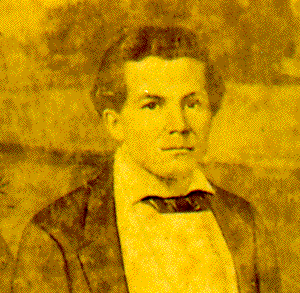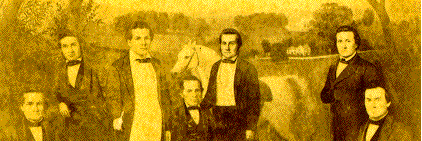 Lieut. Robert Davis Powel, 19th TN Inf CSA 1825 - 1861 |
 Lt. Powel with his brothers - their homeplace in background. Painting by Samuel Shaver Circa 1866 |
|
According to the “Lives of the Judges of the Supreme Court of Tennessee. 1796-1947 by John Green on pages 54 through 55. Samuel Powel was born in Norristown, Pennsylvania, July 10, 1776. he was educated in the common schools and at Philadelphia College. After studying law and being admitted to the bar in his native town he moved to Tennessee, settled and began to practice law in Blountville. Sullivan County. Being an entire stranger in the community he had to make his own way and at first, of course, had no clients and he occupied his leisure time by organizing and teaching law class, believed to be the first of its kind in Tennessee. After getting a start as a practicing lawyer, his next and most important step was his marriage to Miss Mary Rutledge, daughter of General George Rutledge, a prominent citizen of Sullivan County. In 1805 he moved to Rogersville and practiced law, displaying such skill and meeting with such success that his many friends decided that he was entitled to a place on the appellate bench. In 1807, within two years after his removal to Rogersville, he was elected to succeed Judge Emerson as a member of the Superior Court of Law and equity and held the position until January 1810, when the Legislature abolished the Court established the Supreme Court of Errors and Appeals. His next judicial experience which might appear to be in the nature of a demotion, was as judge of the First Circuit Court in 1812-1813, and again in the years of 1819-1841, a post for which Judge Williams states "he was almost ideally fitted and from which he could not be dislodged." Judge Powel (not Powell) during his short term of service on the Appellate bench had for his associates, John Overton, David Campbell and Parry W. Humphreys, and such opinions are only a paragraph long, except Judge Overton's who, being Reporter, often expresses his views at length. Frequently the conclusions of the Court are stated as being the opinion of two judges as, for instance, "Powel and Overton", or "Powel and Humphreys", followed by a very brief statement of their conclusions without their reasons. In one case Powel said he "did not feel prepared to give an opinion because he had not heard all the argument". In another it is stated that "Powel did not give any decisive opinion." In another, "Powel inclined to be of the same opinion". It does not appear that Judge Powel, during his term of service, ever delivered an opinion of more than a paragraph in length, unless some of the "per curiam" opinions can be attributed to him. This is not written to disparage him for he undoubtedly had all the qualifications of a fine judge. The Legislature in 1835-6 paid him the great compliment of naming an East Tennessee County in his honor. Unfortunately the proposed county contained less than the constitutional area and the Act was declared void by the Supreme Court in the case of Bradley vs. Commissioners, 2 Humphreys, page 428. Subsequently the attempt to name a County for him was renewed but for some reason, unknown at this remote date, again failed. The Powels lived about three miles from town. Judge Powel also built a log schoolhouse on this property and taught by an old friend, also from Norristown, Pennsylvania, Mr. Crawford, who he had enticed to move here. According to the writings of Mr. Crawford’s son, Robert Clay Crawford, Judge Powel had promised to pay Mr. Crawford a certain amount of revenue from this school, even if no pupils outside of the three families, Powel’s Fain’s and Mitchells’ should attend. It was on this farm where Robert was born in 1825. It was here that he also attended school. Robert was studying to become an attorney, and in fact, was listed as such in 1850 when the census was taken. His oldest brother, George Rutledge Powel had married Eliza Ruth Fain and another one of his older brothers, Samuel Jackson, was living at this time with the family of the woman he was to marry. His sister married the famous portrait artist, Samuel M. Shaver and they were living with the Robert and his mother at that time. Right after 1850, Robert went to California. Many had left here during the “gold rush” of ‘49. He sent several letters to his brother and mother here at home. Then in June of 1856, he wrote in one letter that if possible he was going to make arrangements to come home and see everyone in the Spring. Indeed he did come home by the time the war broke out in 1861, Robert was the newspaper editor in Rogersville. He was thirty-six years old and unmarried. He probably felt it his duty when he joined the 19th Tennessee Infantry of Confederate forces which was the first company to come out of Hawkins County. His older brother Samuel Jackson was chosen Colonel of the 29th Tennessee Regiment. Nephews of his were also in the 19th Infantry. You may say this man was much like any other man who was killed in the War Between the States, and in a way, he was, with the exception of one thing. Robert D. Powel was said to be the first man to be killed in Kentucky. The Military Annals of Tennessee listed him as the first Confederate soldier to be killed outside of Virginia. This man was a well-traveled, educated man, who was well thought of in his community and loved by his family and friends. His brother-in-law Shaver, the artist, painted a portrait of all seven of the Powel brothers. They were all in black except one who was wearing white and stood beside a white horse. There is no doubt which brother this was. Letters from Robert D. Powel: Photos of Memorial Service, September 23, 2000
Copyright © 2000-2001 by Sheila Weems Johnston
Page created 8/27/2000 |